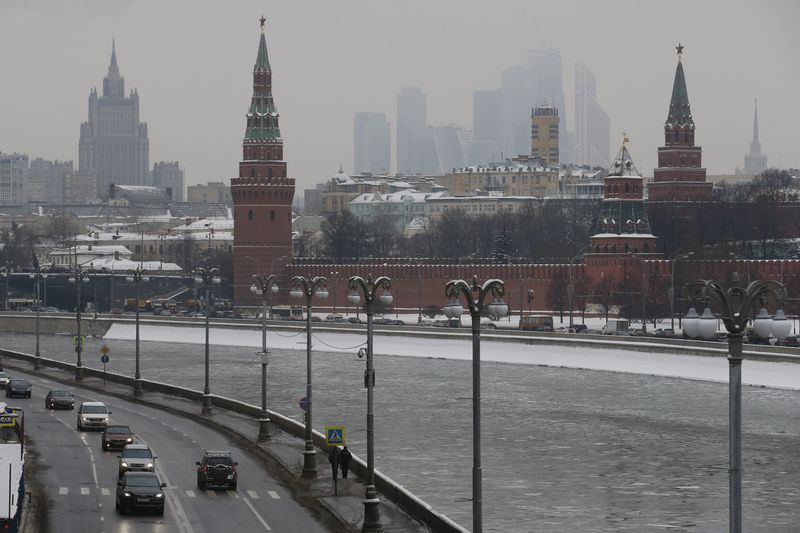By Chris Vellacott and Sujata Rao
LONDON (Reuters) - With Russia battered by international sanctions and weak oil prices, an accelerating capital flight is turning into a brain drain of entrepreneurs that threatens to hurt the economy's long term health.
Immigration lawyers, estate agents and bankers in Europe are reporting a jump in interest from middle class business owners planning to move their ventures and families outside Russia. London is becoming a favourite among would-be emigres seeking financial and political stability.
"People are realising things aren't going to get better for a while and it is time to establish themselves elsewhere," said Katya Zenkovich, head of the Russia desk at upmarket London property company Knight Frank.
Publicly available data shows the haemorrhage of money and people. Consultancy CrossBorder Capital, which tracks financial flows, calculates that $123.8 billion left Russia in 2014. According to Russia's statistics office, more than 203,000 people left the country in the first 9 months of 2014, compared with 186,382 in the whole of 2013 and just 33,578 in 2010.
Zenkovich says that since the middle of last year she has fielded more enquiries from Russian entrepreneurs, looking for retail space in London or modest-sized offices suitable to establish new businesses.
While some are high up the wealth scale and ready to invest millions, others are looking to put up as little as 150,000 to 200,000 pounds ($230,000 to $300,000) for a one-year lease on a central London retail space, she said. Online enquiries to Knight Frank from inside Russia for offices in Europe including Britain jumped 75 percent during 2014 while interest in retail properties was up around 10 percent from a year earlier.
London has an established community of super rich Russians, such as Chelsea Football Club owner Roman Abramovich. But the arrival of a new wave of people from Russia's entrepreneurial class in the millionaire rather than the billionaire bracket is an ominous development for the Russian economy.
Mid-sized enterprises often form the backbone of an economy and typically are less mobile. But when they do move, the departure could be permanent.
Small and medium-sized enterprises make up around a quarter of Russia's economy, according to the European Investment Bank. This is a smaller proportion than in most economies but crucial if Russia wants to wean itself off dependence on energy exports.
Russia's economy has lurched downwards since Moscow annexed Crimea from Ukraine last March, with the West imposing sanctions. More recently a slide in the oil price has slashed revenues from Russia's principal export and the rouble has halved in value against the dollar.
The economy is expected to contract 3 percent this year, according to official forecasts and many reckon the recession could last beyond 2015.
British government data indicate rising demand from Russians for "investor" and "entrepreneur" visas which grant residency in return for commitments to invest.
Britain granted no entrepreneur visas to Russians and 14 investor visas in the first quarter of 2011, according to the Home Office. This has risen steadily since, with 73 investor visas granted in the second quarter of 2014, easing back to 43 in the third quarter, alongside 14 entrepreneur visas.
The entrepreneur visa requires an investment of 200,000 pounds in starting a new enterprise while the investor visa is conditional on 2 million pounds invested in British assets.
Ashley King-Christopher, a partner at lawyers Charles Russell Speechlys, says the exodus is being driven by the end of a boom that followed the Cold War. "We're getting a lot of these entrepreneurs from the middle class who weren't part of an inner circle but they benefited from the consumption boom," he said.
Dmitri Rozanov, head of the Russia desk at London private bank Coutts, says many of his compatriots want political and financial stability that is elusive at home. "Locally in Russia certainly things are not looking particularly optimistic for people with any amount of wealth," he said.
ESTABLISHED COMMUNITY
With an established Russian community, a more dynamic economy than continental Europe and a sought-after private school system, Britain may seem a natural haven.
"We're seeing quite a few new enquiries whether it's retail units, art galleries, restaurants, office space ... People want to come to a place where they consider their lives, their future, their prosperity and their income to be safe," says Gary Hersham, co-owner of London estate agent Beauchamp Estates.
The arrivals often comprise entire families. There are currently 2,536 Russian pupils at private schools in Britain, 16 percent up on a year ago, according to the Independent Schools Council. That's close to 5 percent of the total.
"We would have loved to have stayed in Russia but there's a very deep crisis. We looked at different options but an English education is the best," said one Russian, declining to be identified for fear of damaging the business interests of her husband who flies back and forth but plans to settle in Britain soon.
One established Russian entrepreneur in London, Igor Sagiryan, a former investment banker who founded restaurant chain Ping Pong, says the exodus is "extremely bad for Russia".
A recent foray back into Russia with a real estate venture lost him money as the rouble collapsed. "Business is a mess in Russia, businessmen are losing money and as a result lots of people are trying to get their money out and start somewhere else," he says.
